Top
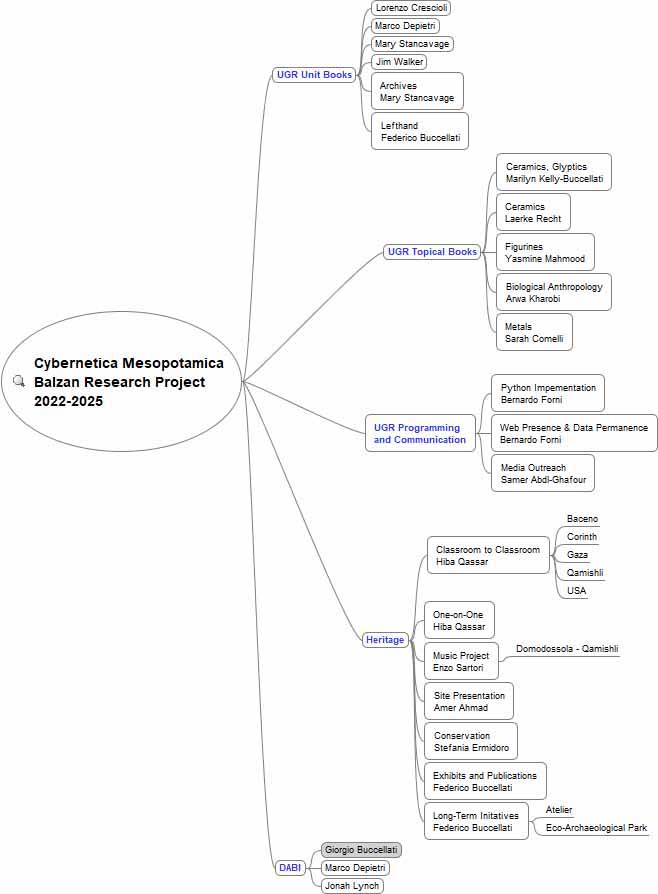 General plan of the workshop Beola 2
General plan of the workshop Beola 2
 In the picture, from left to right; first row: Bernardo Forni, Lorenzo Crescioli, James Walker; second row: Peter Kuon, Giorgio Buccellati, Mrs. Kuon, Marilyn Kelly-Buccellati, Jonah Lynch, Laerke Recht, Jessica Scaciga, Amer Ahmad, Marco De Pietri, Samer Abdel-Ghafour
In the picture, from left to right; first row: Bernardo Forni, Lorenzo Crescioli, James Walker; second row: Peter Kuon, Giorgio Buccellati, Mrs. Kuon, Marilyn Kelly-Buccellati, Jonah Lynch, Laerke Recht, Jessica Scaciga, Amer Ahmad, Marco De Pietri, Samer Abdel-Ghafour
Back to top: Brief Report
Introduction
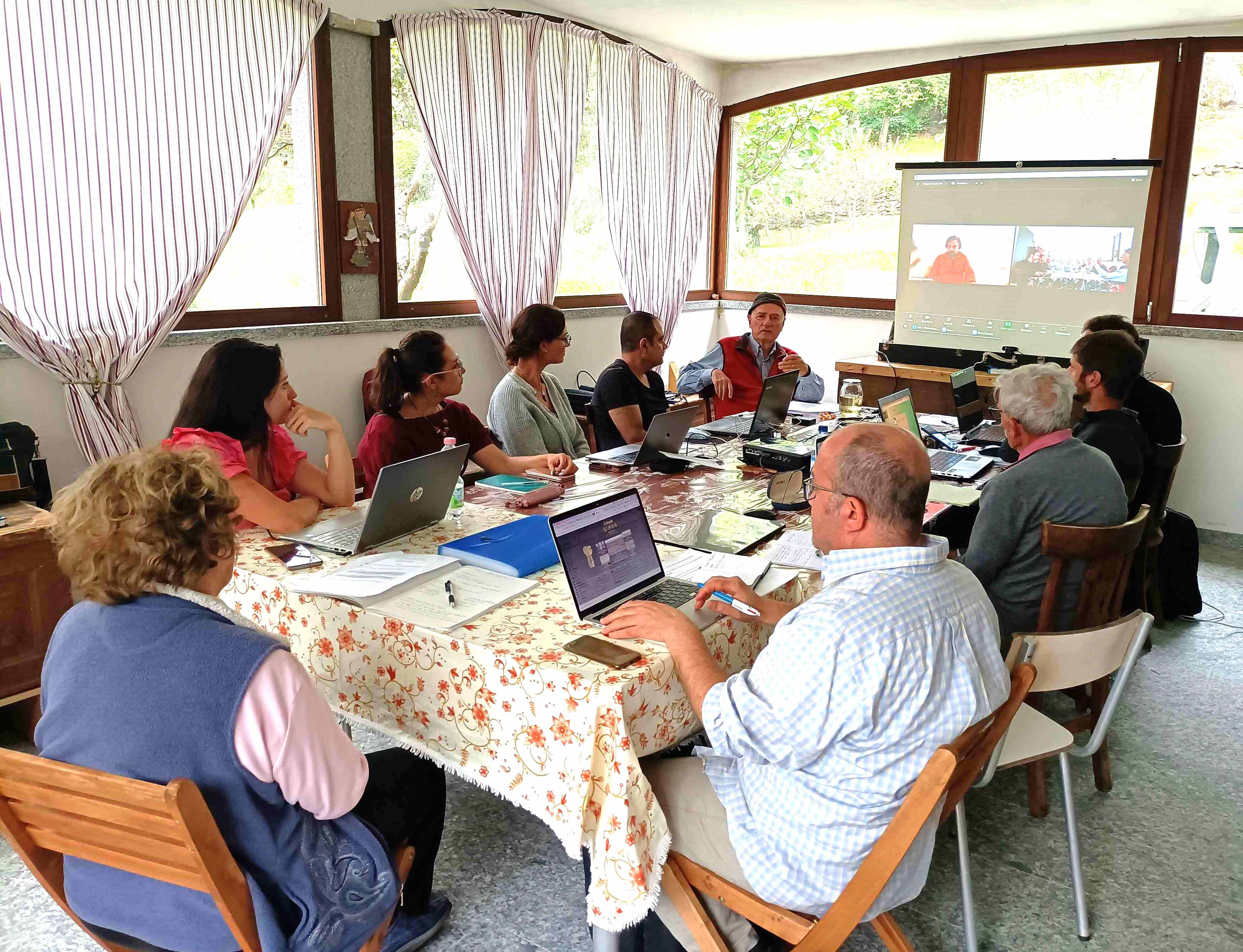 (In the picture, from left to right; back: Marilyn Kelly-Buccellati; left side: Hiba Qassar, Jessica Scaciga, Laerke Recht, Amer Ahmad, Giorgio Buccellati; right side: Samer Abdel-Ghafour, James Walker, Lorenzo Crescioli, Bernardo Forni).
(In the picture, from left to right; back: Marilyn Kelly-Buccellati; left side: Hiba Qassar, Jessica Scaciga, Laerke Recht, Amer Ahmad, Giorgio Buccellati; right side: Samer Abdel-Ghafour, James Walker, Lorenzo Crescioli, Bernardo Forni).
During the period September 5–12, 2022, a second workshop was taken in Beola, gathering many members of the Urkesh/Tell Mozan’s staff, involved in different aspects related to the many projects connected to the ancient site of Tell Mozan and the parallel projects pertaining to the “4Banks” websites.
The following members attended the workshop in person: Prof. Giorgio Buccellati; Prof. Marilyn Kelly-Buccellati; Amer Ahmad; Lorenzo Crescioli; Marco De Pietri; Bernardo Forni; Samer Abdel Ghafour; Jonah Lynch; Hiba Qassar; Laerke Recht; Jessica Scaciga; James Walker.
Attending the workshop from remote was also granted to other members, uncapable to attend in person: Prof. Federico Buccellati; Sarah Comelli; Stefania Ermidoro; Arwa Kharobi; Yasmine Mahmoud; Mary Stancavage.
The daily work of the team was divided into a morning session (9 AM to 12 noon) and an afternoon session (2:30 PM to 7 PM).
The sessions were also divided into two distinct categories: specialized sessions (on Monday, September 5 and from Friday, September 9 to Monday, September 12) and general sessions (from Monday, September 5 to Thursday, September 8). General sessions were intended to provide the whole team with a general overview of the many ongoing projects and the main trajectories leading the communal work within the frame of the overall “Cybernetica Mesopotamica Balzan Research Project 2022-2025”; the specialized sessions were instead dedicated to different specific works and the whole team spitted into smaller working groups focused on singular projects which are briefly described in the following paragraphs.
Back to top: Brief Report
Monday, September 5
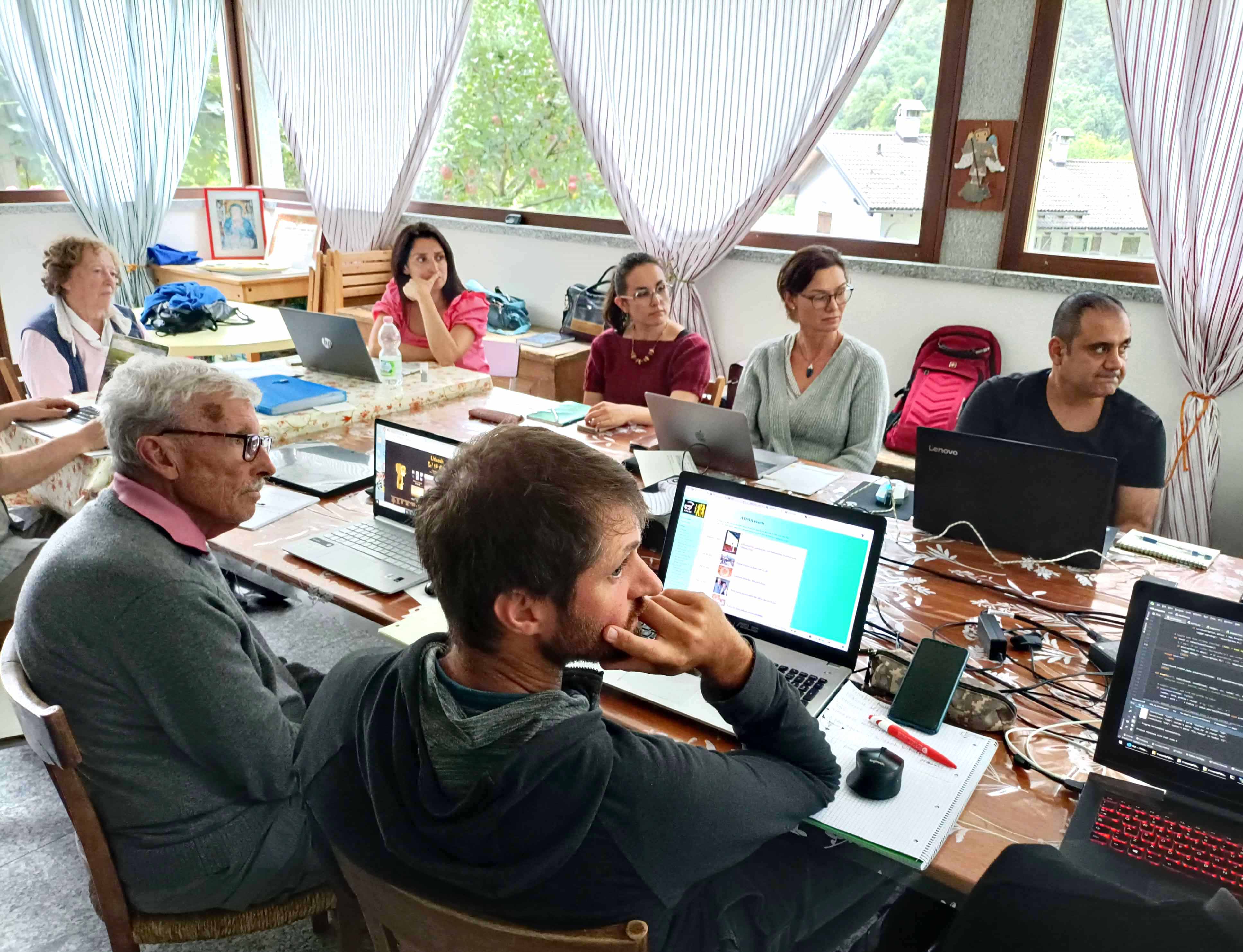 (In the picture, from left to right; first row: James Walker, Lorenzo Crescioli; left side: Marilyn Kelly-Buccellati; right side: Hiba Qassar, Jessica Scaciga, Laerke Recht, Amer Ahmad).
(In the picture, from left to right; first row: James Walker, Lorenzo Crescioli; left side: Marilyn Kelly-Buccellati; right side: Hiba Qassar, Jessica Scaciga, Laerke Recht, Amer Ahmad).
On Monday, September 5, the team dedicated the morning specialized session to the technical review of the new UGR (“Urkesh Global Record”) program, while in the afternoon a general session was taken about the current status and future desiderata of the UGR system as a whole.
Back to top: Brief Report
Tuesday, September 6
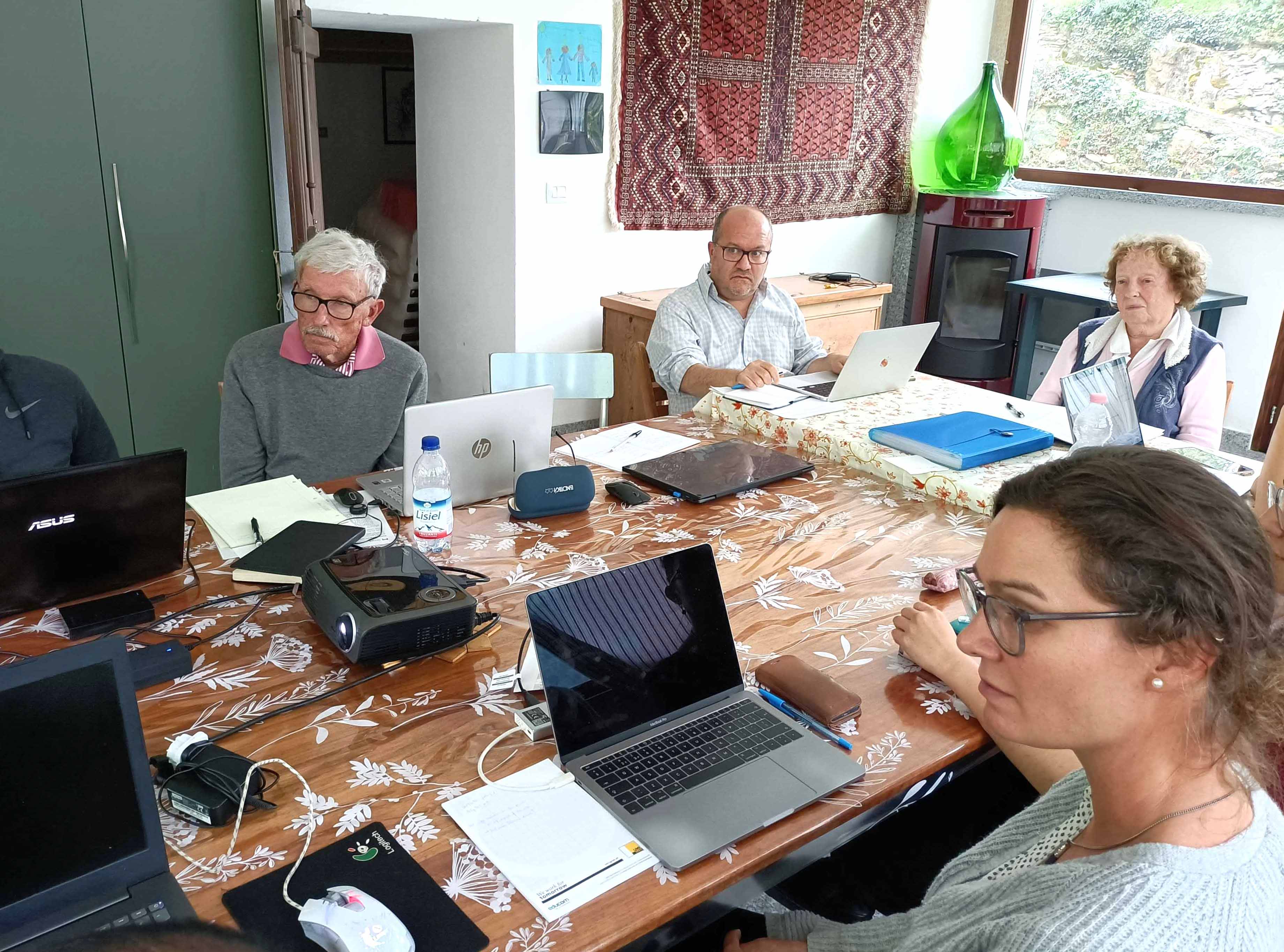 (In the picture, from left to right: James Walker, Samer Abdel-Ghafour, Marilyn Kelly-Buccellati, Laerke Recht).
(In the picture, from left to right: James Walker, Samer Abdel-Ghafour, Marilyn Kelly-Buccellati, Laerke Recht).
Tuesday, September 6, was devoted to two general sessions dedicated to two specific aspects of the UGR system, namely the “left-hand side” (in the morning) and the “UGR Topical Books” (in the afternoon).
Back to top: Brief Report
Wednesday, September 7
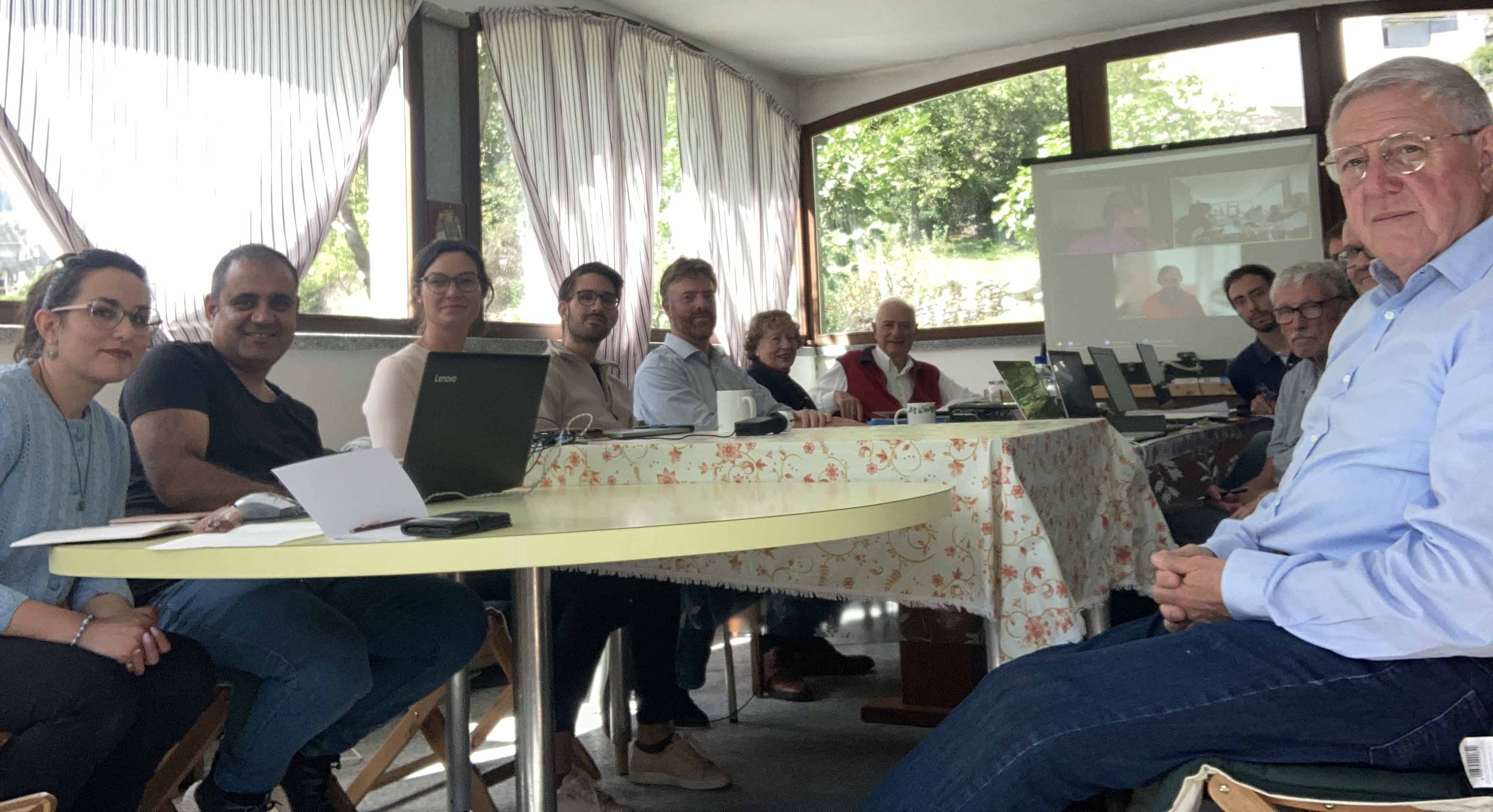 (In the picture, from left to right; left side: Jessica Scaciga, Amer Ahmad, Laerke Recht, Marco De Pietri, Jonah Lynch, Marilyn Kelly-Buccellati, Giorgio Buccellati; right side: Bernardo Forni, Lorenzo Crescioli, James Walker, Samer Abdel-Ghafour, Rodolfo Signorini).
(In the picture, from left to right; left side: Jessica Scaciga, Amer Ahmad, Laerke Recht, Marco De Pietri, Jonah Lynch, Marilyn Kelly-Buccellati, Giorgio Buccellati; right side: Bernardo Forni, Lorenzo Crescioli, James Walker, Samer Abdel-Ghafour, Rodolfo Signorini).
On Wednesday, September 7, the morning general session dealt with the urkesh.org website as a whole: in this session, the team discussed both the content and the format of the overall website; the afternoon general session of the same day was instead about the “Heritage Project”, mostly focusing on the digital dimension of this ongoing program.
Back to top: Brief Report
Thursday, September 8
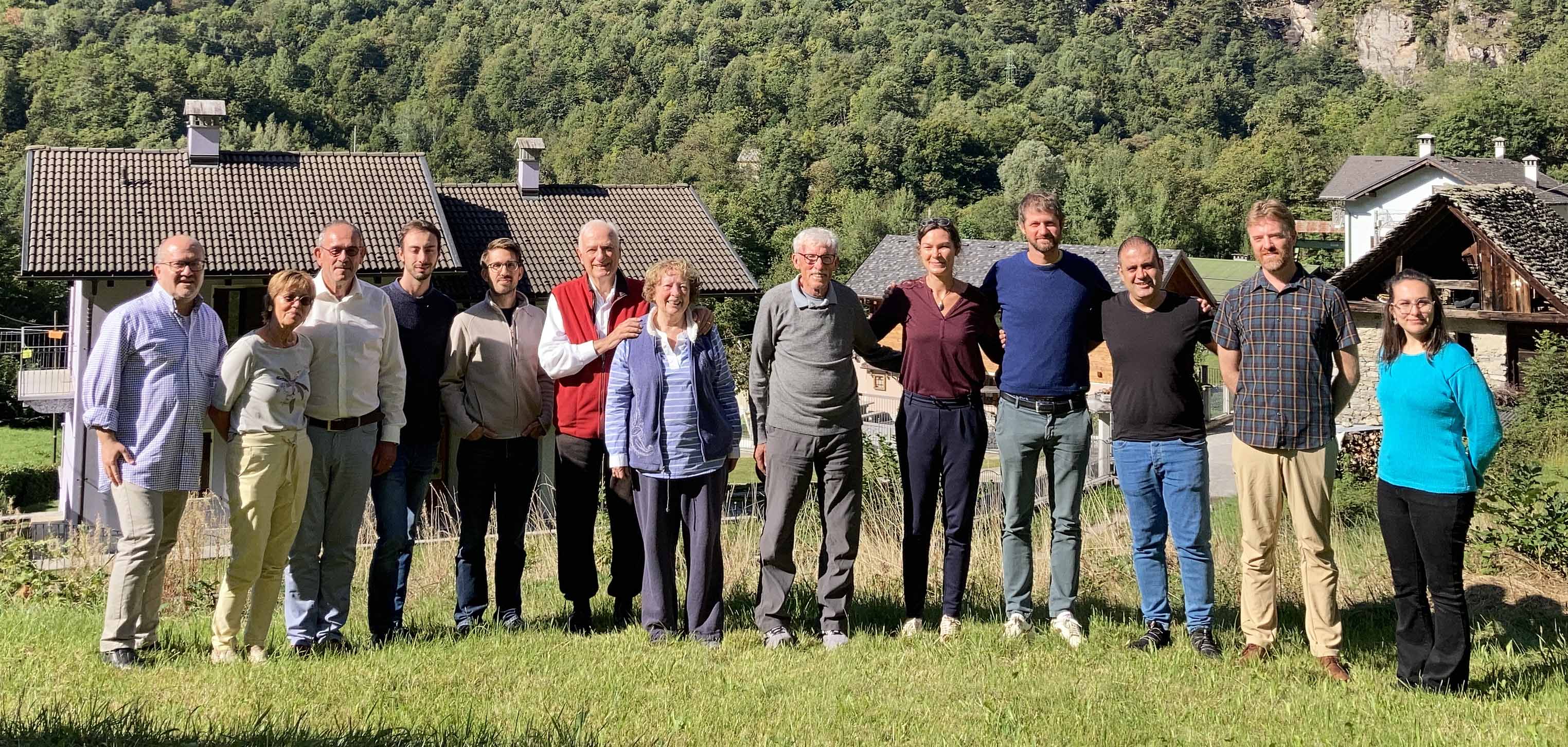 (In the picture, from left to right: Samer Abdel-Ghafour, Mrs. Kuon, Peter Kuon, Bernardo Forni, Marco De Pietri, Giorgio Buccellati, Marilyn Kelly-Buccellati, James Walker, Laerke Recht, Lorenzo Crescioli, Amer Ahmad, Jonah Lynch, Jessica Scaciga).
(In the picture, from left to right: Samer Abdel-Ghafour, Mrs. Kuon, Peter Kuon, Bernardo Forni, Marco De Pietri, Giorgio Buccellati, Marilyn Kelly-Buccellati, James Walker, Laerke Recht, Lorenzo Crescioli, Amer Ahmad, Jonah Lynch, Jessica Scaciga).
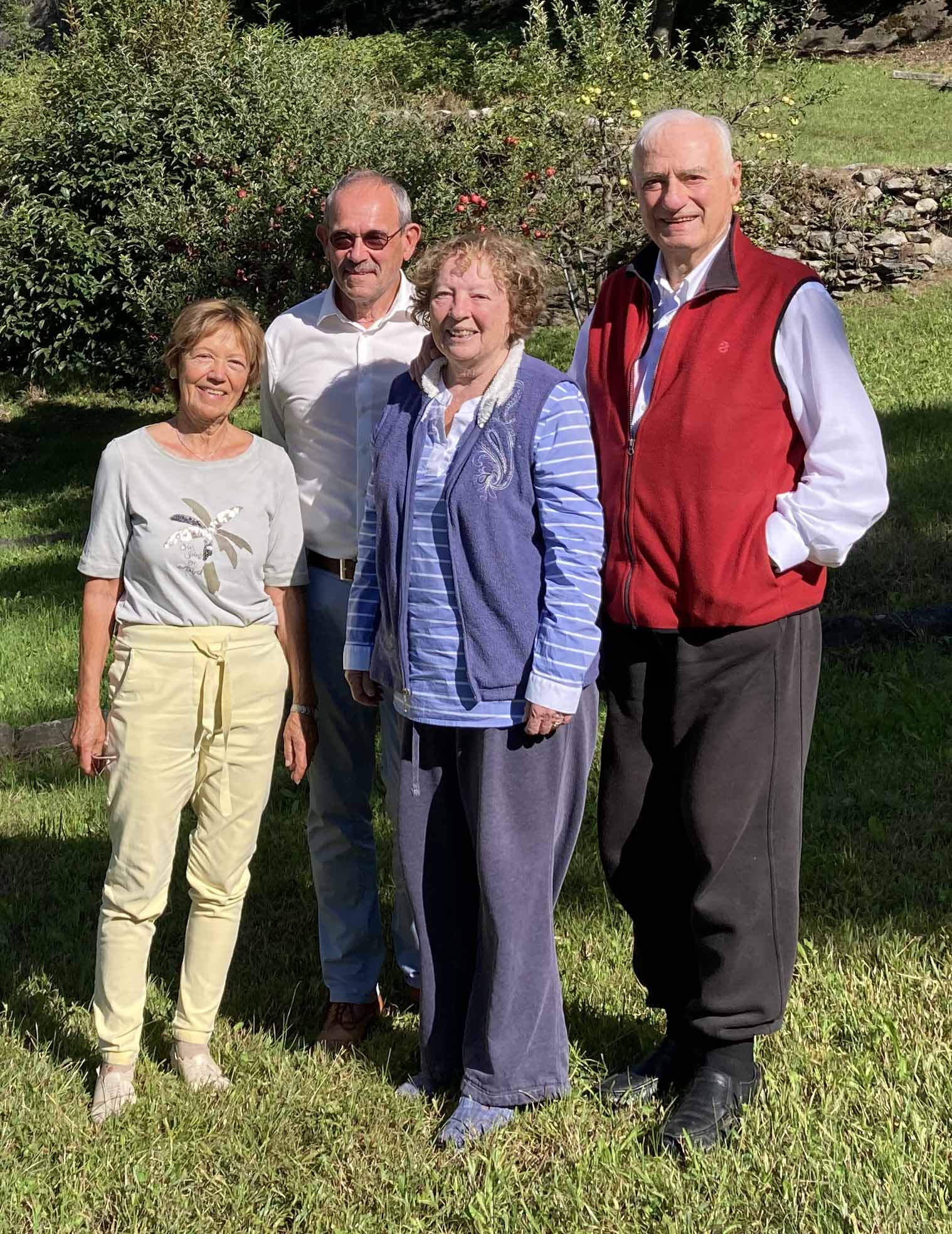 (In the picture, from left to right: Mrs. Kuon, Peter Kuon, Marilyn Kelly-Buccellati, Giorgio Buccellati).
(In the picture, from left to right: Mrs. Kuon, Peter Kuon, Marilyn Kelly-Buccellati, Giorgio Buccellati).
Thursday, September 8, was a special day for the whole team; in fact, after a general session in the morning, dedicated to the bibliographical project “4Banks”, the workshop was honored (during the plenary afternoon session) with the presence of Prof. Peter Kuon (University of Salzburg), Vice Chairman of the “Balzan General Prize Committee”, together with his wife, whose kindness and inspiring words have strongly reinforced the commitment of the team towards the project. In this plenary session, after a general introduction by Prof. Giorgio Buccellati, Prof. Marilyn Kelly-Buccellati, and Prof. Federico Buccellati, each member of the team had the opportunity to briefly present and discuss together with the team and the honorable guests his/her current work on some of the many projects conducted under the aegis of the overall “Cybernetica Mesopotamica Balzan Research Project 2022-2025”; at the end of all the presentations, some of them presented online, Prof. Giorgio Buccellati summarized the main trajectories of the project, underlining both the transparency and the coherence of the overall system. After this conclusion, Prof. Peter Kuon and his wife kindly addressed the team, encouraging it to keep working on this framework of interactive and communal effort, stressing the importance of seeing how this workshop perfectly fits the main guidelines and overall spirit of the “Balzan Prize”, aiming at encouraging projects conducted by young researchers.
In the end, Prof. Giorgio Buccellati presented to the team and the two guests the new hub website called “Cybernetica Mesopotamica”, specifically developed after (and also thanks to) the Balzan Prize; this website, after a preface which states the theoretical framework behind all the aforementioned websites, displays the cluster of the many connections between the different websites related to different projects, and will offer, besides the proposal presented for the Balzan Prize, a chronicle, collecting all the events (alongside the IIMAS and the AVASA websites, the latter available both in English and Italian) and publications related to the “Cybernetica Mesopotamica Balzan Research Project 2022-2025”, the interim and final reports on the forthcoming achievements, and even the reports and recordings of the workshops periodically taken (in person or virtually) by the team.
Back to top: Brief Report
Friday, September 9 - Monday, September 12
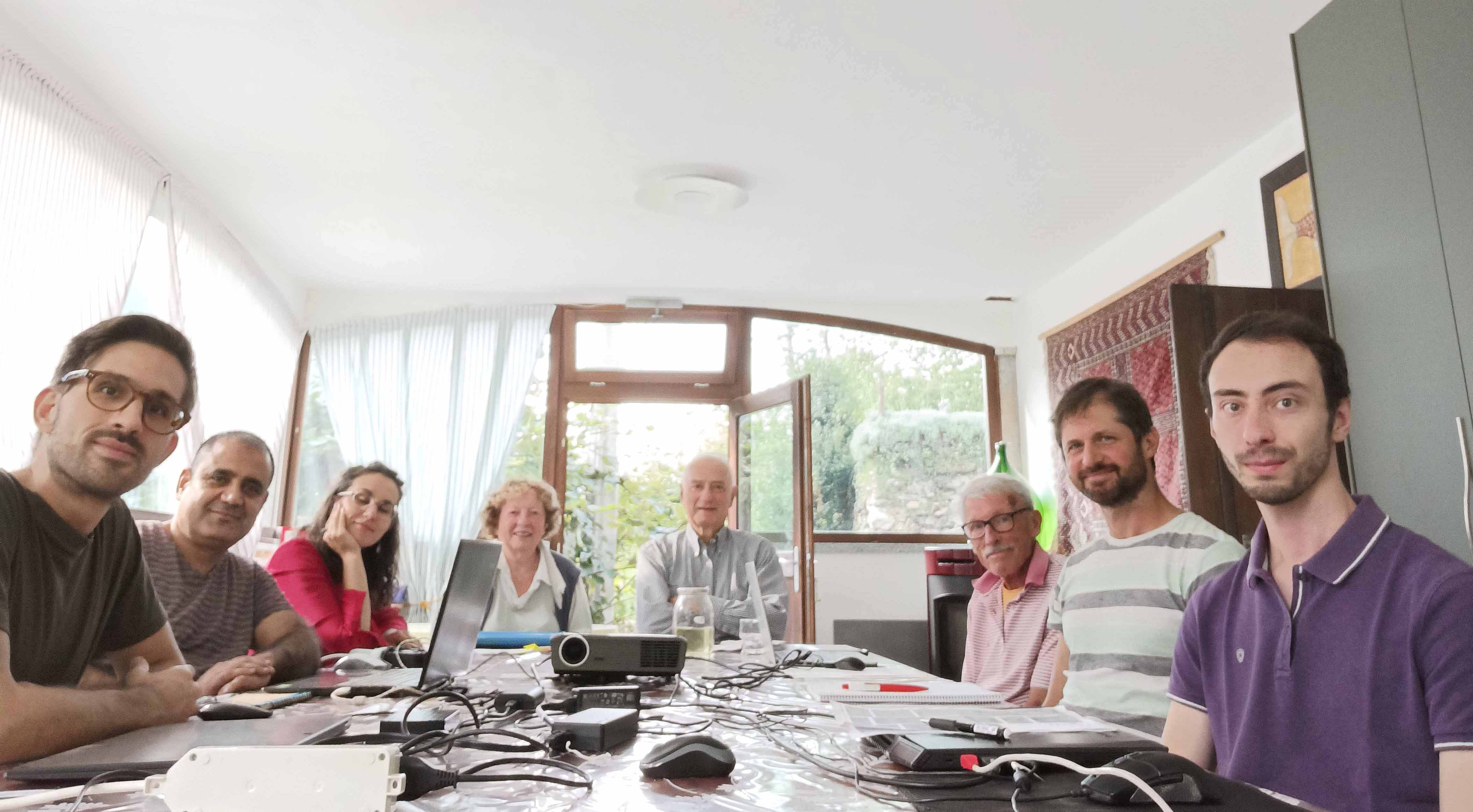 (In the picture, from left to right; left side: Marco De Pietri, Amer Ahmad, Jessica Scaciga; front: Marilyn Kelly-Buccellati, Giorgio Buccellati; right side: James Walker, Lorenzo Crescioli, Bernardo Forni).
(In the picture, from left to right; left side: Marco De Pietri, Amer Ahmad, Jessica Scaciga; front: Marilyn Kelly-Buccellati, Giorgio Buccellati; right side: James Walker, Lorenzo Crescioli, Bernardo Forni).
From Friday, September 9 to Monday, September 12, many sessions of work have been dedicated to technical applications of the new UGR program.
Back to top: Brief Report
Conclusions
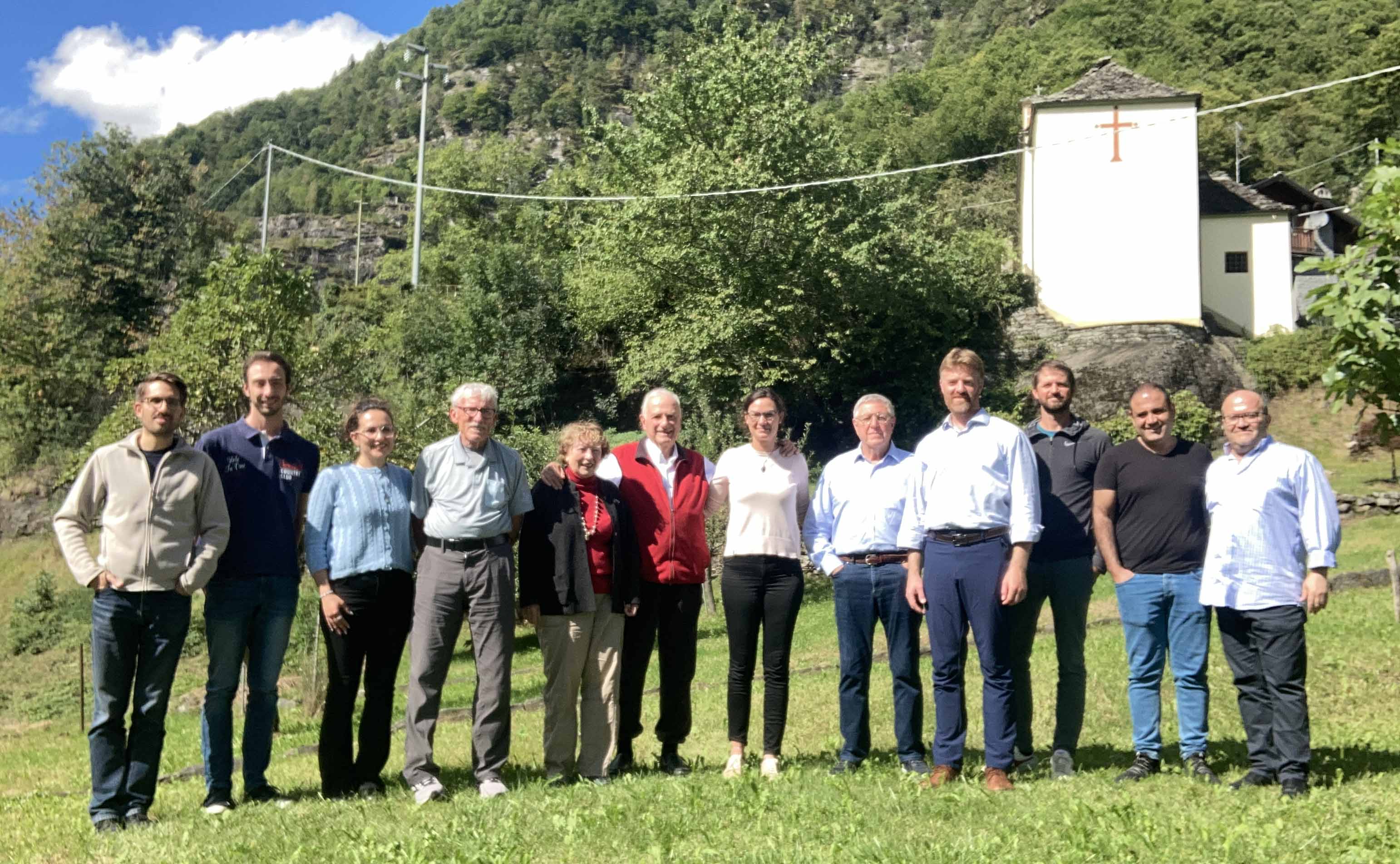 (In the picture, from left to right; Marco De Pietri, Bernardo Forni, Jessica Scaciga, James Walker, Marilyn Kelly-Buccellati, Giorgio Buccellati, Laerke Recht, Rodolfo Signorini, Jonah Lynch, Lorenzo Crescioli, Amer Ahmad, Samer Abdel-Ghafour).
(In the picture, from left to right; Marco De Pietri, Bernardo Forni, Jessica Scaciga, James Walker, Marilyn Kelly-Buccellati, Giorgio Buccellati, Laerke Recht, Rodolfo Signorini, Jonah Lynch, Lorenzo Crescioli, Amer Ahmad, Samer Abdel-Ghafour).
The “Workshop Beola 2” officially ended on Monday, September 12; nevertheless, some members of the team (Samer Abdel Ghafour, Bernardo Forni, Marco De Pietri, Yasmine Mahmoud, Jessica Scaciga, and James Walker) spent (under the supervision of Prof. Giorgio Buccellati and Prof. Marilyn Kelly-Buccellati) some further days together (namely, September 13–14) to further work on some specific aspects of the forthcoming efforts.
In the end, the workshop turned out to be a very successful and fruitful event, mostly for two reasons: 1) the large team of people working on different projects related to Urkesh/Tell Mozan and the “4Banks” websites had the chance to meet in person (but even on remote) after many years (the last plenary workshop took place in 2011); 2) this communal work was indeed a precious moment for sharing ideas and elaborate practical strategies for the next steps of our work, establishing a precise agenda for the future, to achieve many different goals, fostering the knowledge about Urkesh, and preserving a shared awareness towards the heritage of its distant (but even always “present”) past.
PDF version downloadable here.
Back to top: Brief Report